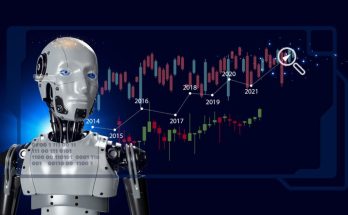Through the years technology has taken over numerous industries, however there are very few who have the kind of capacity to alter the world like blockchain. This decentralized and secure system in particular is starting to cause a stir in foreign exchange markets, or forex, where it is bringing solutions to long-held problems. The implementation of blockchain in forex offers faster settlements, lower costs, greater transparency, and also allows smaller traders to enter a market which has historically been dominated by institutions.
If you’ve ever wondered what blockchain could mean for the world’s biggest financial market, this article covers its benefits, challenges and why it might be the answer to a trading world for all.
What Exactly is Blockchain and What is its Relevance to the Forex Market?
At its most basic, blockchain is a ledger detailing transactions that’s shared among a network of computers. Take away private entities that control transfers, and ensure that data is stored on multiple nodes so it can’t be tampered with.
The $7 trillion-a-day market where currencies are traded, known as the forex, has long been the domain of intermediaries like banks and brokers.This system functions as intended, but it’s slow, costly and prone to errors. Here is where Blockchain fits in as a disruptor to address these pain points through automation, smart contracts and a decentralize access.
What do Forex and Blockchain have in common?
With forex, time is of the essence. Here’s how blockchain revolutionizes settlements:
Quick Transaction Confirmations: Time Saving
Transaction confirmations are immediate in comparison to other banks that take minutes if not hours to confirm a transaction.
In comparison, traditional forex transactions potentially take two business days for intermediary authorisations and verification, due compliance verifications to be processed. Blockchain on the other hand can facilitate almost immediate settlements because these steps can effectively be automated through the use of smart contracts. Picture converting euros into dollars in seconds rather than days. Not only is this convenient, but it will also minimize the potential to lose money on changes in the exchange rate if delays are encountered.
Lower Costs, Fewer Middlemen
Intermediaries such as banks or clearinghouses usually charge fees to execute trades. Those costs can pile up, particularly for high-frequency traders and smaller firms that are operating with slim margins. Using blockchain, transactions happen directly between people, without intermediaries, and without fees slashed. Hsbc’s blockchain settlement project, for example, is said to have cut FX costs by 25%.
Enhanced Transparency
Blockchain is transparent and cannot be changed by any one entity. This resolves the disputes caused by ledger inconsistencies, as all transaction detail can be verified in real-time on the common ledger. Regardless if you’re a veteran trading with larger amounts in the crypto markets or just a beginner lacking some confidence, these are trust-building informations at its finest!
Improved Security
It doesn’t mean the forex markets are impervious to scams or hacking though. And its decentralized architecture is far more resistant to manipulation. Each trade is encoded and connected to previous transactions, providing a chain that would be nearly impossible to alter without someone getting wise.
Advantages of Blockchain in Forex
The benefits of blockchain are not just for settlements but for forex trading in general. Here’s who could benefit, and how:
A. Expanded Access for Small Traders
Banks, financial institutions and wealthy individuals have always been the big players in forex trading historically. Blockchain breaks down barriers by providing a direct way into the market. Decentralized systems also allow the general public with an internet connection to access forex trading.
B. Stablecoin Connotations as Financial Inclusion
As stablecoins (digital currencies pegged to fiat currencies like the dollar or euro) take off, blockchain fills the void for traders in developing economies. Think of a small business owner in Africa who can avoid traditional banking regulations to participate in forex trading using stablecoin-based platforms.
C. Automation via Smart Contract
Smart contracts are self-executing trades according to a set of pre-defined conditions. This ensures there is no human oversight that would lead to mistakes. A forex trader might set a smart contract to automatically purchase euros at a certain exchange rate, without doing a thing.
Parsing the Challenges of Implementing Blockchain in Forex
The potential is immense but adoption for blockchain has a long way to go, given hurdles. Before it can be successfully assimilated into the forex industry, it must overcome these challenges:
Scalability Issues
The forex market handles more than 5 million transactions everyday. However, existing blockchain systems, e.g. Ethereum, face difficulties of processing and onboarding such backlog volume because of low transaction-per-second (TPS) rate. Addressing this problem of scalability is an important challenge for the new generation system’s deployment.
Regulatory Uncertainty
Forex is a global market, and in some areas regulations may be tighter than in others. Compliance with anti-money laundering (AML) laws and KYC regulations is difficult in light of Blockchain’s decentralized structure. It’s a challenge to build a framework which includes blockchain without the loss of goodness.
Integration Costs
It’s a big investment for traditional to blockchain. Banks must be able to see a viable ROI in order to invest in the technology.
Smart Contract Risks
Smart contracts may cut down on human error, but they aren’t invulnerable to coding maladies. In the past, badly coded contracts have already incurred too many losses in blockchain systems, so it is important to enforce strict quality controls.
The Future Of Blockchain In Forex
Experts opine that blockchain is here to stay and its impact on forex settlements only stand to increase. Here is what the future might look like:
Increasing Size and Importance of Decentralized Finance (DeFi) Offerings
DeFi platforms let people trade with currencies but don’t use traditional brokers. Particularly attractive to individuals and smaller firms that do not have access to institutional trading systems.
Effects on Digital Currencies of the Central Bank (CBDCs)
China, and increasingly India, are already experimenting with CBDCs, which can run on blockchain systems. These state-sponsored digital currencies could even simplify forex trading and stabilize markets over time, the analyst added.
Tokenization of Currencies
The way we buy and sell forex might change quite a lot if fiat currencies become tokenized (converted to digital tokens on a blockchain schema). These tokens enable faster trading and more liquidity.
Why You Should Care
Whether you’re a professional forex trader, a mom and pop shop owner, or an average Joe who’s seen one too many things about blockchain online, you have good reason to be following these events. Blockchain’s penetration into the forex world therefore promises a democratized, efficient and transparent process which will only be beneficial for all involved.
But like all new technologies, its adoption isn’t without its challenges. It will be the partnership between the regulators, banks and innovators in tech, that will dictate how much blockchain can go ahead to transform the forex market.
Final Thoughts
That blockchain in forex exists is no longer a theory; it’s a reality that is increasingly becoming popular. It’s tearing down walls, speeding up and cutting the cost of settlements, and more accessible than ever before. And while obstacles such as regulation and scalability remain, the potential rewards are more than worth it.
Picture a world where when you swap currencies there are no delays, no hidden costs and no middlemen taking a cut of your profits. That’s the utopia blockchain is enabling, and it’s much closer than people think.
So to those that aren’t paying attention to the role of blockchain in forex: You might just find yourself on your rear in a rapidly changing market that’s spinning faster and faster by the day. The time to adjust, learn, and get ready for a financial revolution is NOW!



